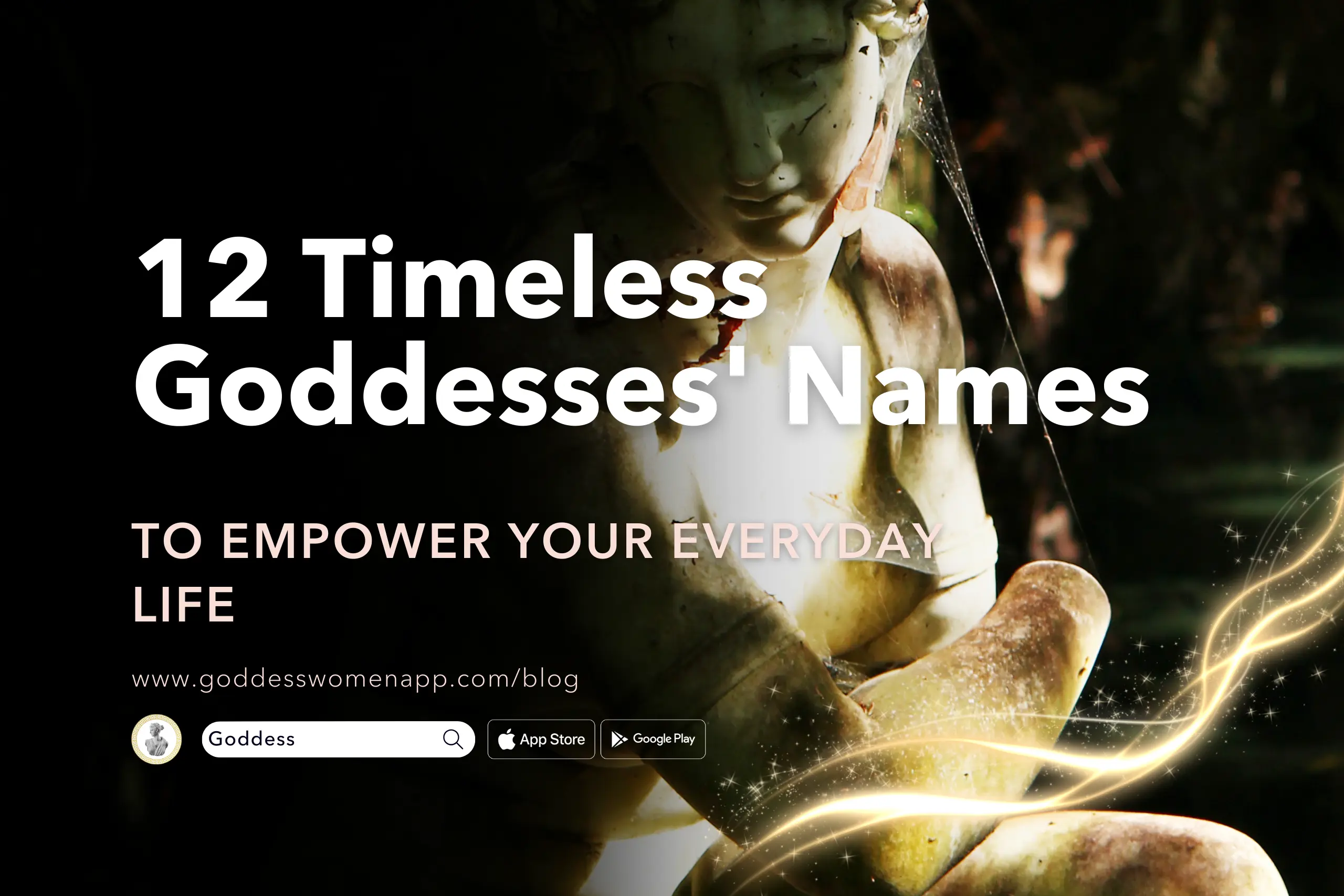Table of Contents
Introduction
Across the vast expanse of mythology, goddesses’ names evoke a sense of wonder, power, and wisdom. Whether we’re delving into Greek mythology with the mighty Greek goddess Athena, exploring the depths of ancient Roman religion with Venus, or embracing the rich tapestries of Norse and Hindu mythologies, each culture brings its own divine stories to the table. The Greek goddess Athena, known for her unparalleled wisdom, stands as a testament to the power of the goddess of war and strategy. From Mount Olympus to the underworld, Greek mythology is teeming with stories of divine beings like Zeus, Poseidon, and Aphrodite, whose symbols like the olive tree and the sea nymph invoke timeless legends.

Equally captivating are the tales of the Greek goddesses. Artemis, the goddess of the hunt and twin sister to Apollo, represents the wild spirit of raw energy and eternal youth. In the realm of Roman gods, Juno shines as the queen and protector of women and marriage, while Venus, the Roman counterpart to Aphrodite, embodies beauty and fertility.
In the intricate web of mythology, the goddesses’ names carry stories of birth, magic, and wisdom, intertwining with the fates of mortals and gods alike. From the depths of the sea to the peaks of Mount Olympus, these goddesses’ stories have traveled through sacred hymns and lyric poetry, resonating across time. As we explore the significance of these timeless goddesses’ names, we uncover how their legacies continue to empower our lives, offering guidance and inspiration in the modern world.
Goddesses’ Names: Their Significance and Symbolism
From the ancient halls of Mount Olympus to the realms of the underworld, goddesses’ names have always held profound significance. Each name carries within it stories of wisdom, magic, and eternal youth. In Greek mythology, goddesses’ names reflect the rich diversity of characters that influence the world. The Greek goddess Athena, born from the mind of the sky god Zeus, stands as a beacon of wisdom and warfare, the patron of Athens and a symbol of strategy. Her association with the olive tree signifies peace and prosperity, linking her to the fertility of the earth.
The tales of the Greek goddesses are filled with epic poetry and sacred hymns. Aphrodite, the goddess of love, embodies beauty and desire, and her symbols like the seven Pleiades and the sea nymphs echo her connection to the seaand the heavens. Artemis, twin sister of Apollo, the goddess of the hunt, reigns over the wild animals and the forest, wielding her hunting dogs and representing the primal raw energy of nature.
In ancient Roman religion, goddesses also played a central role. Juno, the queen of the gods, watched over women and marriage, while Venus, the Roman equivalent of Aphrodite, was revered for her beauty and powers of attraction. The Norse goddess Freya encompasses the magic of love and war, while in Hindu mythology, goddesses like Lakshmi represent prosperity and fertility.

Minor goddesses and other gods played pivotal roles in these mythologies, weaving tales through lyric poetry and sacred poetry that celebrate their influence over nature and mortals alike. The stories of mother earth Gaia and godswho control the sun and moon show how these divine beings shape the world. As muses of creativity, the goddesses embody music, dance, and poetry.
These goddesses’ names not only highlight their divine attributes but also serve as a testament to the richness of human culture. The legacy of these names persists, inspiring stories of empowerment and devotion that transcend time, embodying ideals that continue to resonate deeply within us.### Greek Goddess Athena: The Wisdom of Warfare and Strategy
In the pantheon of Greek gods and Greek goddesses, the name Athena shines with unparalleled brilliance. As the Greek goddess of wisdom, warfare, and strategy, she is one of the most revered deities in Greek mythology. Her birth itself is legendary, springing fully formed from the forehead of the sky god Zeus, a symbol of her divine intellect and strategic prowess. Unlike many of her divine siblings, Athena was the only one trusted to wield her father’s thunderbolt, marking her as a patron god of protection and justice.
Athena’s influence permeates sacred poetry and lyric poetry, inspiring stories of valor and virtue. She is often depicted in epic poetry and art, adorned in armor and accompanied by the olive tree, her sacred symbol of peace and wisdom. Her favorite wild animal, the owl, embodies the sharp vision and insight for which she is known. Despite her associations with war, Athena’s demeanor is often measured, emphasizing strategy over brute force, unlike the more chaotic and destructive gods.
As the goddess of warfare and wisdom, Athena’s name is synonymous with both intellect and power. She stood in contrast to Aphrodite, the goddess of love, and her symbols, like the olive branch and the aegis, are emblems of defense and intellect rather than beauty and allure. She held a special place among Greek gods and goddesses, often mediating conflicts between other gods with her calm logic and strategic mind.
In ancient Roman religion, Athena was worshipped as Minerva, maintaining her association with wisdom and warfare. Her name is invoked in the sacred hymns of Mount Olympus, where her wisdom is celebrated in music and dance. Athena is also known to guide heroes and mortals alike, serving as a muse and protector, offering counsel that has echoed through centuries of history.
Her divine beauty and power have influenced the world far beyond the realms of Greece and Rome. In Greek mythology, she embodies the spirit of eternal youth and wisdom, guiding mortals in their pursuit of knowledge and strategy. Whether depicted in art or poetry, Athena represents the enduring strength of the human spirit, offering lessons that transcend time and inspire us to this day.

Greek Goddesses in Greek Mythology: More Than Just Legends
Greek mythology, with its pantheon of gods and goddesses, offers a rich tapestry of stories that transcend mere legend. The goddesses’ names echo through the ages, representing power, wisdom, and beauty. These Greek goddesses hold pivotal roles in the epic tales of Greek mythology and have influenced cultures across the world.
Among the most revered of these deities is Greek goddess Athena, the daughter of Zeus and the embodiment of strategy and warfare. Her image stands as the very symbol of wisdom and strength, not only as a warrior but also as a protector of the city of Athens. Athena’s attributes, such as the olive tree and the aegis, highlight her role as a defender of women, warriors, and the mother earth.
Aphrodite, the goddess of love and beauty, represents the raw energy of desire and fertility. Her symbols, like the dove and the seven Pleiades, illustrate her connection to love and passion. She influenced other gods and mortals alike, and even ancient Roman religion revered her as Venus, the embodiment of feminine allure and fertility.
Artemis, the twin sister of Apollo and goddess of the hunt, embodies the wild spirit of nature. She roams the forests with her hunting dogs and is a fierce protector of wild animals and maidens. Her association with the moon and nature connects her to the underworld and magic, further cementing her place among the divine.
These Greek goddesses also reflect the influence of minor goddesses and muses, who inspired creativity in music, poetry, and sacred poetry. They are often contrasted with the gods of the sea, like Poseidon, and the underworld, like Hades, representing the softer yet equally powerful aspects of the divine feminine.
The goddesses’ names continue to resonate in lyric poetry and epic poetry, their stories told in sacred hymns that celebrate their strength and beauty. The tales of these Greek goddesses have not only shaped history but continue to inspire us today, offering insights into life, love, and the enduring power of the divine feminine.

Ancient Roman Religion: Roman Goddesses and Their Influence
In ancient Roman religion, Roman goddesses reflected similar ideals to their Greek counterparts, yet they held their own unique influence. Venus, the goddess of love and fertility, was revered for her beauty and passion, much like Aphrodite in Greek mythology. Her name is synonymous with beauty and sensuality, inspiring devotion in mortals and gods alike.
Juno, the queen of the gods and protector of marriage and women, was seen as the embodiment of the divine feminine in Rome. She was the wife of Jupiter, the Roman sky god, and her influence reached deep into Roman society, overseeing the sanctity of marriage and childbirth.
Diana, known as Artemis to the Greeks, was the goddess of the hunt, wild animals, and the moon. She wielded raw energy, represented by the hunting dog and the bow, and was considered a protector of the wild and the young.
The Roman pantheon also included minor goddesses like Ceres, the goddess of the harvest and agriculture, who ensured the fertility of the earth and the prosperity of Roman agriculture. Together, these Roman goddesses’ names evoke the wisdom and power of the divine feminine, leaving a lasting impact on history.

Goddesses’ Names Across Other Cultures
Beyond Greece and Rome, goddess names across cultures continue to leave a lasting legacy. The Norse goddess Freyaembodies love, beauty, and magic. She rides her chariot drawn by cats and rules over eternal youth, guiding the souls of the fallen to Valhalla.
In Hindu mythology, Saraswati is the goddess of knowledge, music, and poetry. Her name represents the ultimate muse of learning, worshipped by students and scholars for inspiration in their pursuits.
The great mother of the earth, Gaia, holds a central place in the mythologies of many cultures, representing mother earth and the nurturing force that sustains life. In many traditions, she is seen as the goddess who gave birth to the world and all its creatures, symbolizing the interconnectedness of nature and fertility.
From the sea nymphs of Greek legends to the sacred hymns and epic poetry of Hindu traditions, goddesses’ names transcend time and culture, reflecting the divine feminine’s universal influence. These stories continue to inspire modern interpretations, reminding us of the muses who guide us in our everyday lives.

12 Timeless Goddesses’ Names to Empower Your Everyday Life
In the rich tapestry of world mythology, the names of goddesses hold profound significance, offering inspiration and empowerment in every era. Here are 12 timeless goddesses’ names that embody qualities to inspire us all:
1. Athena (Greek Mythology)
– The Greek goddess Athena stands as the embodiment of wisdom and strategy. Known for her keen intellect and warrior spirit, Athena guides those who seek justice and truth. Her association with the olive tree symbolizes peace and prosperity.
2. Aphrodite (Greek Mythology)
– The goddess of love and beauty, Aphrodite inspires with her passion and creativity. Her symbols include the seven Pleiades and dove, reflecting her connection to love, fertility, and beauty.
3. Artemis (Greek Mythology)
– The goddess of the hunt, Artemis is known for her fierce independence and mastery over nature. Her affinity with wild animals and skill with her bow and hunting dog inspire a spirit of adventure.
4. Hera (Greek Mythology)
– Queen of the gods and protector of women and marriage, Hera embodies strength and leadership. As Zeus’ wife, she plays a key role in the Greek pantheon, upholding the sanctity of family and fidelity.
5. Venus (Ancient Roman Religion)
– The Roman counterpart to Aphrodite, Venus represents love, fertility, and prosperity. Her influence extends across ancient Roman religion, inspiring devotion with her beauty and nurturing spirit.
6. Freya (Norse Mythology)
– The Norse goddess Freya symbolizes love, magic, and war. She is associated with fertility and eternal youth, guiding souls to Valhalla and wielding considerable influence over life and death.
7. Isis (Egyptian Mythology)
– Known as the great mother, Isis is the protector of children and the mother of gods. She symbolizes healing, magic, and rebirth, offering comfort and guidance to those in need.
8. Lakshmi (Hindu Mythology)
– The Hindu goddess of wealth and prosperity, Lakshmi embodies abundance and generosity. She is revered for bringing fertility and good fortune to those who worship her.
9. Demeter (Greek Mythology)
– Goddess of the harvest, Demeter represents mother earth and the bounty of the natural world. She ensures the fertility of the land and protects the cycles of life and growth.
10. Gaia (Greek Mythology)
– Gaia, the personification of earth, gave birth to the Greek gods and represents the primal force of nature. She stands for the interconnectedness of all living things and the nurturing spirit of the planet.
11. Hestia (Greek Mythology)
– The Greek goddess of the hearth and home, Hestia embodies the warmth of family and the sanctity of domestic life. She represents hospitality and the sacredness of the hearth fire.
12. Diana (Roman Mythology)
– The Roman counterpart of Artemis, Diana is the goddess of the hunt and the moon. She is revered for her independence and devotion to protecting the natural world.
These goddesses’ names are more than just symbols of myth; they offer timeless values that can empower and inspire us in our daily lives. Their stories reflect the raw power, wisdom, and nurturing energy that have shaped cultures across the world.

FAQ
What is the prettiest goddess’s name?
In mythology, beauty is often subjective and linked to individual characteristics. However, Aphrodite, the goddess of love and beauty, is widely recognized for her allure and is often cited as having one of the prettiest names.
Who is the most powerful female goddess?
Several goddesses are recognized for their immense power, but Athena, the Greek goddess of wisdom and warfare, is often considered one of the most powerful due to her strategic prowess and influence in Greek mythology.
What is a fancy goddess name?
A name that exudes elegance and grace is Isis, the Egyptian goddess known for her magic and nurturing qualities. Her name carries an aura of ancient mystery and sophistication.
What is a mythical girl’s name?
A popular mythical name for girls is Artemis, the goddess of the hunt and protector of the wilderness. As the twin sisterof Apollo, her name embodies adventure and strength.
Conclusion
Throughout history, the goddesses’ names of various mythologies have been more than just symbols; they embody the spirit of wisdom, beauty, strength, and love that has guided humanity across centuries. From the strategic prowess of the Greek goddess Athena to the nurturing spirit of Isis and the magical allure of Freya, these goddesses offer lessons that are still relevant today. They remind us of the importance of embracing our inner strengths and understanding the archetypes that shape our lives.
As you navigate your own journey, let these timeless goddesses inspire you to unlock your potential and discover the archetypes that resonate with your own unique essence. Download the Goddess app today to take the archetype quiz and find out which goddess embodies your spirit. Embrace the wisdom of these ancient goddesses and let their stories empower you on your path to self-discovery.





